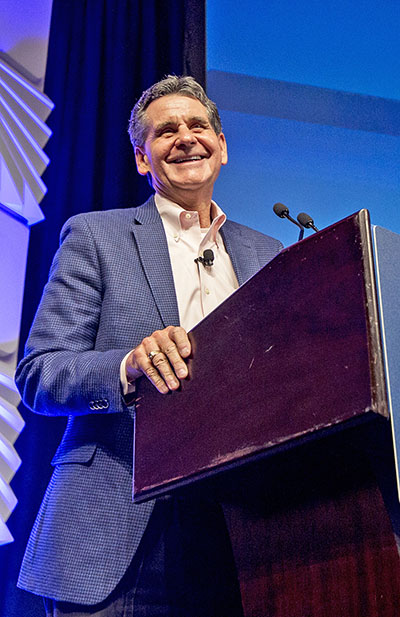In remarks before close to 2,000 electric cooperative leaders and guests attending CFC Forum 2019, held July 1–3 at the New York Hilton Midtown in New York City, CFC CEO Sheldon C. Petersen stressed that any strategic response to disruptive industry change must be crafted through a consumer lens.
 "The dynamics of today's utility sector are unlike any we've seen before," he declared. "The velocity of disruption continues to accelerate, driven by new technologies and rising competition from both traditional and nontraditional players. On top of this, our industry is being profoundly shaped by four megatrends: disintermediation [cutting out the middleman]; decentralization [a shift away from central station power to individuals and distributed systems]; digitalization [employing automation technologies and information to transform business operations]; and decarbonization."
"The dynamics of today's utility sector are unlike any we've seen before," he declared. "The velocity of disruption continues to accelerate, driven by new technologies and rising competition from both traditional and nontraditional players. On top of this, our industry is being profoundly shaped by four megatrends: disintermediation [cutting out the middleman]; decentralization [a shift away from central station power to individuals and distributed systems]; digitalization [employing automation technologies and information to transform business operations]; and decarbonization."
Disintermediation, Petersen noted, is no longer about nimble new entrants displacing inefficient businesses—like Uber and Lyft upending taxis or Airbnb cutting into hotels. "Older firms are getting in on the act, too. Look at Shell, the second-largest oil company. Who could have predicted that a petroleum giant founded in 1907 would try to reposition itself as a twenty-first century disruptor? But that's exactly what they're trying to do. In fact, Shell wants to be the largest power company in the world by the early 2030s—bypassing electric utilities to provide end-use consumers and business with a 'total package' of energy products and services, including solar, storage and electric vehicle charging assets."
The CFC chief also pointed out that socially responsible investment has experienced explosive growth over the past few years. "Companies that measure the sustainability and ethical impact of their businesses using environmental, social and governance—or ESG—factors have seen a dramatic uptick from investors in recent years. One ESG-focused investor group—Climate Action 100+—counts a cumulative $32 trillion in assets."
He added: "At CFC, we can foresee a time when bond investors may start asking us about electric cooperative capital spending decisions and how they impact climate change. Fortunately, [because of the shift in generation fuels over the past decade], we feel we're well-positioned to answer those questions."
Petersen outlined three ways that cooperatives can respond effectively to disruption:
Develop a technology plan with the member experience in mind. "Simply using technology to empower consumers with more control and choices is no longer enough—they expect companies to operate ethically and stand for values they can identify with. This plays to our strengths as co-ops."
Develop more dynamic operational and financial plans. "The old investment cycles that were part of every co-op's financial blueprint may no longer be practical in today's disruptive environment. Shorter time frames enable greater flexibility in fashioning solutions through technology that previously could only have been accomplished by poles and wires."
Understand risks and opportunities. "If the future plays out like some have predicted—with a tripling of electricity consumption as everything from transportation, heating and other segments of the economy become electrified—that presents an enormous opportunity. It also opens the door to new outfits like Shell, which in a business lifecycle is creating renewal. I believe electric cooperatives are ideally positioned for renewal as well. The question is: How will we respond?"
